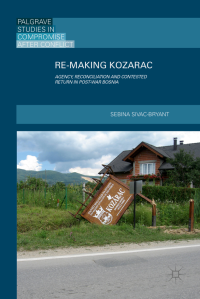 My book Re-making Kozarac: Agency, Reconciliation and Contested Return in Post-War Bosnia is now available for pre-order via Amazon or my publisher Palgrave Macmillan, with the hardcover due in the shops at the beginning of May.
My book Re-making Kozarac: Agency, Reconciliation and Contested Return in Post-War Bosnia is now available for pre-order via Amazon or my publisher Palgrave Macmillan, with the hardcover due in the shops at the beginning of May.
The book is the product of a decade-long research project into the incredible story of one of Bosnia’s only examples of successful contested minority return after the end of the war. It is a story of resilience, imagination and discovered agency that demonstrates what ordinary people can achieve when placed in extraordinary circumstances.
We cannot deny the overwhelming sense of victimhood that continues to pervade every fibre of our life, but we have another story to tell and that is one of our fight…
From the start of this project, I was interested to understand how people respond to violence, and how they sometimes manage to bounce back despite their trauma; and, overall, how can a community remake itself after having been completely destroyed in the physical realm?
It begins with the story of how a group of people who were tortured, incarcerated and then expelled managed to form an exceptional fighting force, the 17th Krajina Brigade of the Bosnian Army, which kept hopes of return alive among the Kozarac community in exile, and shows how the self-reliance and confidence they gained on their epic journey home created a platform for return, even though Kozarac remained under the authority of those who destroyed the town. It goes on to show how women then picked up the baton and forced the hand of international agencies to support what they considered “spontaneous return” and documents some of the struggles that followed to recover and commemorate the dead, rebuild the town and eventually achieve a sustainable community amidst a still relatively hostile Republika Srpska.
Although this is an academic work of ethnography that I hope will provide useful primary material for those trying to understand how we can better support the natural desire of refugees and the displaced to return to their homes despite all the challenges and compromises this entails, at its heart, this book is the story of a remarkable group of people, and one that I hope any reader can enjoy and learn from.
My own journey in writing this book has convinced me that the most important resource in any post-conflict situation is the remarkable resilience and adaptability of those directly affected, and rather than focusing on external “expert” interventions around trauma and reconciliation, we should instead provide practical assistance and support to returnees, who are quite capable of negotiating the complexities of recovery and reconciliation if given the right context in which to do so.
a commenter from Bosnia: I don’t know whether the book may offer therapy for all of us but reading the summary, it seem as though it can wake up feelings of pride and self-confidence.
If you would like to discuss interviews, re-publishing elements of the story or speaking invitations, please contact me directly.
A book about not just suffering, but survival – and return, literally… It starts with one of the little-told phenomena of recent military history, that of ‘The Army of the Dispossessed’, made up mostly of soldiers who had survived the camps and Serbian ‘cleansing’, fighting to go home, and documents the challenges that followed in re-making “the biggest little city in the world.” Sebina knows this story from the inside – and her book is key to understanding Bosnia, Europe and the resilience of humankind.”
Ed Vulliamy, The Guardian.
The author offers a compelling and provocative ethnography of Muslim return, which shows how victims of ethnic cleansing, usually described as ‘passive’ and ‘helpless’, take the initiative and reclaim their livelihoods.. The book holds up a mirror to well-intentioned transitional justice, reconciliation, and psycho-social interventions initiatives which often fail to address the real issues that returnees face. It also very interestingly explores the role of online community platforms in restoring the damaged social networks of displaced communities.”
Prof. Dr. Ger Duijzings, Professor of Social Anthropology at the University of Regensburg and Graduate School for East and Southeast European Studies
…written with a combination of passion and sober realism by one of the displaced people themselves. Sebina Sivac-Bryant has produced a truly remarkable piece of research.”
Prof. John Brewer, Professor of Post Conflict Studies, Queen’s University Belfast
One of the Evening Standard’s best books of 2016
